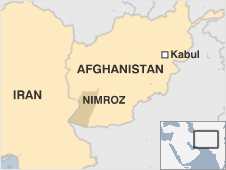[url]http://news.bbc.co.uk/1/hi/world/south_asia/7997749.stm [/url]
From the BBC.
Taleban 'kill love affair couple'

The Taleban in Afghanistan have publicly killed a young couple who they said had tried to run away to get married, officials say.
The man, 21, and woman, 19, were shot dead on Monday in front of a mosque in the south-western province of Nimroz.
Nimroz is an area where the Taleban have a strong influence.
Governor Ghulam Dastageer Azad told the AFP news agency the killings followed a decree by local religious leaders and were an "insult to Islam".
Dangerous region
Mr Azad said: "An unmarried young boy and an unmarried girl who loved each other and wanted to get married had eloped because their families would not approve the marriage."
Officials said the couple were traced by militants after they tried to go to Iran. They were made to return to their village in Khash Rod district.
"Three Taleban mullahs brought them to the local mosque and they passed a fatwa (religious decree) that they must be killed. They were shot and killed in front of the mosque in public," the governor said.
He said there were some reports that the families of the young couple could have links with the Taleban. The Taleban could not be immediately reached for comment.
Correspondents say that the killings took place in a remote and dangerous region, where the government has no access.
The Taleban ruled Afghanistan from 1996 to 2001 and during that time implemented its austere interpretation of Islamic Sharia law, carrying out public killings and floggings.
Unmarried men and women were forbidden from talking or meeting in public and women were not allowed out of their homes without a male relative. Girls were discouraged from going to school.
Extrajudicial "honour killings" have been widely carried out in Afghanistan since then by conservative families angered by a relative who has brought them shame - usually by refusing to marry a chosen partner.
The Taleban have widened their influence over the past three years and now control many remote districts where there are not enough coalition forces to establish a permanent presence.
From the BBC.
Taleban 'kill love affair couple'

The Taleban in Afghanistan have publicly killed a young couple who they said had tried to run away to get married, officials say.
The man, 21, and woman, 19, were shot dead on Monday in front of a mosque in the south-western province of Nimroz.
Nimroz is an area where the Taleban have a strong influence.
Governor Ghulam Dastageer Azad told the AFP news agency the killings followed a decree by local religious leaders and were an "insult to Islam".
Dangerous region
Mr Azad said: "An unmarried young boy and an unmarried girl who loved each other and wanted to get married had eloped because their families would not approve the marriage."
Officials said the couple were traced by militants after they tried to go to Iran. They were made to return to their village in Khash Rod district.
"Three Taleban mullahs brought them to the local mosque and they passed a fatwa (religious decree) that they must be killed. They were shot and killed in front of the mosque in public," the governor said.
He said there were some reports that the families of the young couple could have links with the Taleban. The Taleban could not be immediately reached for comment.
Correspondents say that the killings took place in a remote and dangerous region, where the government has no access.
The Taleban ruled Afghanistan from 1996 to 2001 and during that time implemented its austere interpretation of Islamic Sharia law, carrying out public killings and floggings.
Unmarried men and women were forbidden from talking or meeting in public and women were not allowed out of their homes without a male relative. Girls were discouraged from going to school.
Extrajudicial "honour killings" have been widely carried out in Afghanistan since then by conservative families angered by a relative who has brought them shame - usually by refusing to marry a chosen partner.
The Taleban have widened their influence over the past three years and now control many remote districts where there are not enough coalition forces to establish a permanent presence.

